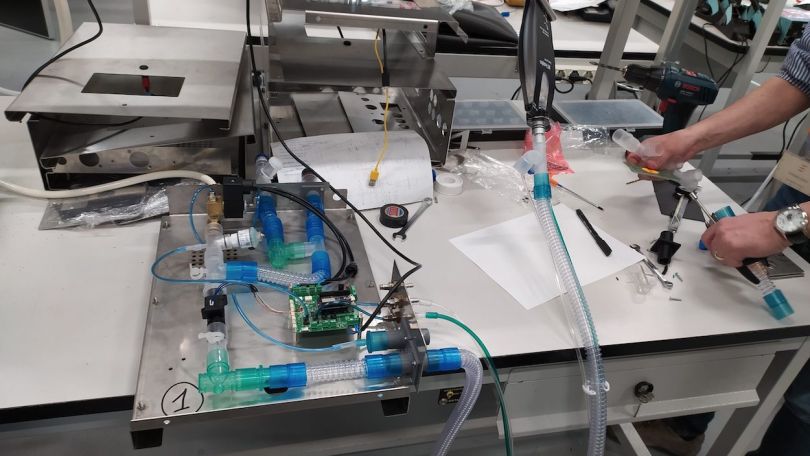
Fermilab, a Batavia-based U.S. Department of Energy Office of Science laboratory that normally focuses on particle physics and accelerator research, has joined the fight against COVID-19. Just this week, a low-cost ventilator its scientists helped design got approved by the Food and Drug Administration, a major win for those at the frontlines of this pandemic.
It all started in Milan, where physicist and Gran Sasso Science Institute professor Cristiano Galbiati found himself under lockdown. When he learned Italy was running low on ventilators, he reached out to other researchers he knew to help him design a ventilator that could be produced quickly. Word spread and eventually physicists and engineers from nine countries, including those at Fermilab, were on board.
Soon enough, the ventilator shortage became a matter of international concern. Despite the issues that come with working from home, the researchers managed to keep progress on the project going 24 hours a day because they were located in so many different time zones. Italian scientists could work on the software and hand it off to the Americans at the end of their work day, then the Canadians could go on to test the interface.
“It’s in our DNA to collaborate across borders and in real-time as particle physicists,” Galbiati said in a press release. “As borders went up and supply chains became more difficult, it remained a beacon of hope to me to be able to collaborate internationally. It is important to see that, while the virus is spreading around the world at the speed of jets, the research is spreading at the speed of the internet. And if there’s one way that the virus will be defeated, it’s if the research can prevail.”
After about a month, the researchers came up with the Mechanical Ventilator Milano, a portable, low-cost ventilator with the same capabilities as those ordinarily used in hospitals. The machine was inspired by the simplicity of the Manley ventilator from the 1960s and requires only compressed oxygen as a power source. Researchers today updated the model with a better control system to make it more user friendly to doctors and nurses.
By early April, the MVM prototype was complete and making its way through rigorous testing in Italy. The device was approved by the FDA on May 1 and the designs have been made publicly available, so now anyone in the world can replicate it.
“If you had asked me before all this if it was possible, I would have said now, it would take months,” Marco Del Tutto, a neutrino physicist at Fermilab who helped with the project, said in a press release. “I’ve never done anything like this before, and we weren’t sure if we would succeed. But we all agreed we should at least try. We owed that to everyone.”
Fermilab has also been contributing computing power to COVID-19 research with the Open Science Grid, a network of organizations that provides computing services for science research.
As of last week, the Chicago-area lab has contributed almost two million core hours to projects dedicated to fighting the pandemic.The computing power is being used to run simulations that help researchers model how virus proteins interact with receptors on cells in the human respiratory system, which could eventually help narrow down the search for a potential drug treatment.




